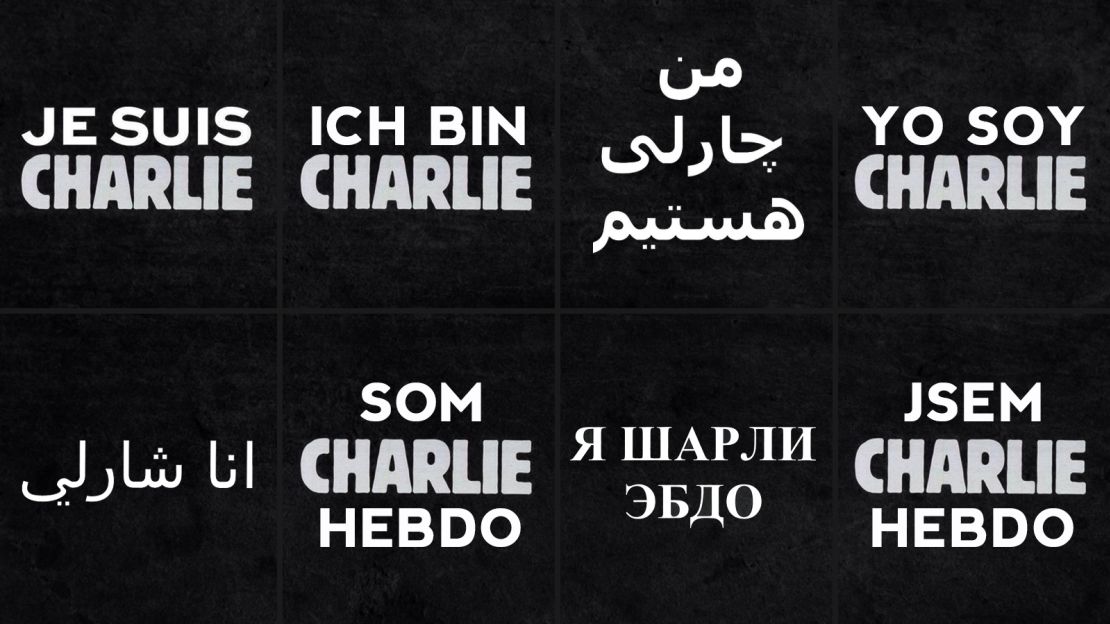Story highlights
Tens of thousands tweet #JeSuisCharlie and Charlie Hebdo publishes the trending phrase on its site
Cartoonists are tweeting support by sharing cartoons; one shows gunman saying, "He drew first"
Social media users expressed solidarity with satirical French magazine Charlie Hebdo after terrorists targeted its office in Paris on Wednesday, killing 12 people.
Using the hashtage #JeSuisCharlie, many on Twitter replaced their profile photo with a white-on-black image of the phrase, which translates to “I am Charlie.”
It’s the phrase that appeared on the Charlie Hebdo website, which linked to a file showing the same phrase repeated in several languages.

Cartoonists and other artists tweeted images that summed up the outrage felt over the attack. One, by The Canberra Times’ political cartoonist David Pope, shows a smoking gun, with a gunmen saying, “He drew first.”
Pope said he sketched the image at 2 a.m. before he went to bed. “I was trying to express an emotional response,” he told CNN. “I’m not trying to make a cheap joke out of it, just trying to express something that hopefully other people are also feeling.”
He said the rights of cartoonists must be defended. “As a cartoonist you are always pushing that line and they pushed it very hard. (But) nothing justified the violent events that happened last night.”
It was shared tens of thousands of times, as were others that depicted the strength of the pencil versus the gun.
Matt Davies, cartoonist for Newsday, expressed shock that anyone would be motivated enough to kill over a cartoon. His image, penned after the attack, showed a confused gunman holding a pencil and asking, “Where’s the trigger?”
“Cartoons are supposed to be offensive, sometimes. And people roll with it. You look at a cartoon, and you say “that’s offensive” and you write a letter to the editor,” he told CNN.
He said the attack caused “a moment of pause” but said he didn’t think that political cartoonists would become less satirical in response.
As the Association of American Editorial Cartoonists condemned what it called a “revolting act of violence,” cartoonists around the world did what they do best to show that would not be cowed.
Among the messages of defiance, were images of grief. This one was posted by Patrick Chappatte from the International New York Times, in memory of his colleagues and friends at Charlie Hebdo.
Magnus Shaw, a copywriter and blogger, tweeted an original Charles M Schulz image of Charlie Brown, his head in his hands, sitting on a park bench. Above, he added the words “Je Suis Charlie.”
“At around 4pm on Wednesday, I tweeted this image. Then it all went a bit nuts…” Shaw wrote on his blog.
He later tweeted: “Charles M Schulz, wherever you are, I hope I didn’t let you down.”
An old New Yorker cartoon is recirculating of a blank page that the cartoonist captioned: “Please enjoy this culturally, ethically, religiously and politically correct cartoon responsibly. Thank you.”
An image released by cartoonist MacLeod comments on the power of a simple picture.
In India, cartoonist Shreyas Navare drew a tribute from Quartz India to the victims of the attack, showing a cup holding pens outweighing the threats from assorted weaponry.
And in the United Kingdom, the Telegraph’s cartoonist, Matt, showed one gunman saying to the other, “Be careful, they might have pens.”
People around the world tweeted their response to the killings, including expressions of support for free speech and the need to maintain the humor that some found offensive enough to kill.
“Terrorising people to not tell jokes. Killing people for telling jokes. More important than ever to keep joking. #Solidarite #JeSuisCharlie,” read one tweet from Malaysia.
“Guns run out of bullets. Journalists will not run out of words. #JeSuisCharlie,” read another tweet.
Twitter was also used to call people to join in rallies in support of the victims throughout France on Wednesday evening. Jessica Hammoutène sent CNN an iReport from a vigil in Lille, France.
Journalists around the world expressed their sympathy and alliance with the principles Charlie Hebdo represents.
One photo showed a newsroom of journalists at Agence France Presse in Paris holding signs that read “Je suis Charlie.”
Another showed journalists at French publication Le Figaro holding copies of Charlie Hebdo covers.
Instagram was also buzzing with shows of support for the magazine.
Bénédicte Huot, who lives in La Seyne-sur-Mer, France, shared a tribute as part of the JeSuisCharlie movement on the site. “Today, liberty is very fragile, but for me liberty is the one,” he said.
Some tweeted “JeSuisCharlie” with photos of four of the victims, cartoonists for the magazine.
A small number of users wrote in support of the mass killings. One called it a defense of his religion. Another wrote it was a response to cartoon depictions of the Prophet Mohammed and said people couldn’t remain silent.
They used the hashtags that CNN translated to #We_Avenged_the_Prophet _of_God and #Paris_Is_Burning.
CNN’s Samira Said contributed to this report.
